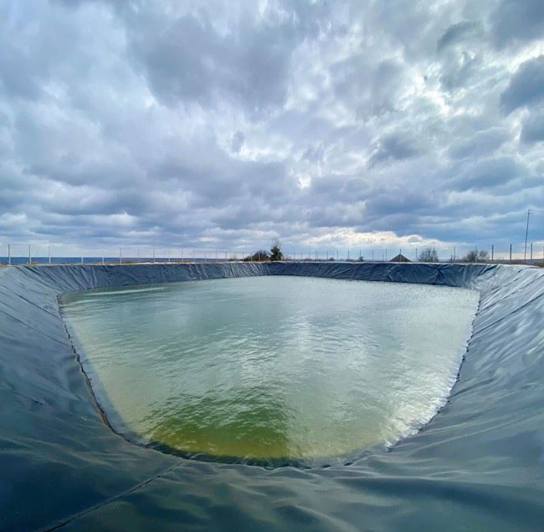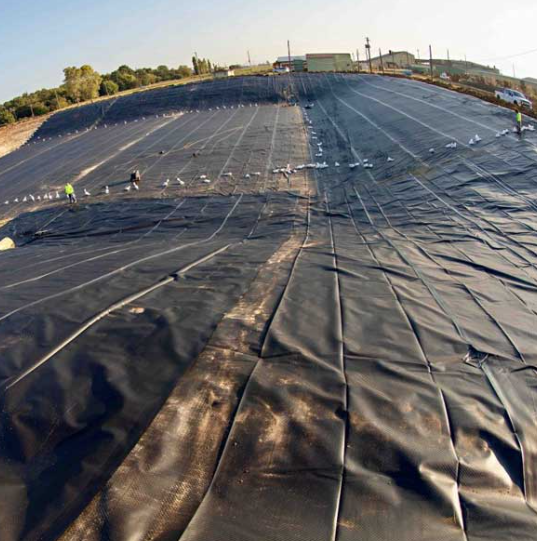- Understanding the Role of Geomembrane Liners in Waste Management
- Innovations in Geomembrane Liners for Water Management
- Geomembrane Liners: A Comprehensive Guide
- The Future of Geomembrane Liners in Civil Engineering
- Geomembrane Liners: Enhancing Landfill Stability
Manager:Alvin Wang
WhatsApp:+62 8983806051
Tel:+86 10-5797-1075
Email:steelwang@okorder.com
Address:3rd Floor, No.2 Building, No.1 Sanlihe Road
Can Geomembrane Replace Cement?
In the realm of construction and environmental engineering, the materials used significantly influence the sustainability, efficiency, and overall impact of a project. Cement has long been a cornerstone of construction due to its strength and versatility. However, with growing environmental concerns and advancements in technology, alternative materials like geomembrane are being explored. This article examines whether geomembrane can replace cement, evaluating their properties, applications, and advantages to understand the potential of geomembrane as a viable substitute for cement in various contexts.

Comparing Properties and Applications
Properties and Applications of Cement
Cement is a fundamental component in the creation of concrete, which is used in an extensive range of construction applications. Its primary benefits include:
- Strength and Durability: Cement-based concrete provides exceptional compressive strength, making it ideal for constructing buildings, bridges, roads, and other infrastructure that require high load-bearing capacity.
- Versatility: Cement can be molded into virtually any shape and size, making it highly adaptable to various architectural and structural designs.
- Fire Resistance: Concrete structures exhibit excellent fire resistance, enhancing the safety of buildings.
- Long Lifespan: Properly constructed cement structures can last for decades, offering long-term durability.
However, the production of cement is highly energy-intensive and contributes significantly to CO2 emissions, accounting for approximately 8% of global emissions. This environmental impact has driven the search for greener alternatives.
Properties and Applications of Geomembrane
Geomembranes are synthetic membranes typically made from polymers such as high-density polyethylene (HDPE), low-density polyethylene (LDPE), or polyvinyl chloride (PVC). They are primarily used for their impermeability and chemical resistance. Key attributes include:
- Waterproofing: Geomembranes are highly effective at preventing fluid migration, making them ideal for lining ponds, landfills, and canals.
- Chemical Resistance: They resist degradation from a wide range of chemicals, ensuring longevity in harsh environments.
- Flexibility: Geomembranes can conform to various shapes and surfaces, providing versatile solutions for containment and barrier applications.
- Environmental Safety: The production of geomembranes typically generates fewer greenhouse gases compared to cement, and they can be recycled.
Advantages and Limitations of Geomembrane and Cement
Advantages of Geomembrane
1. Environmental Impact: Geomembranes have a lower carbon footprint compared to cement, as their production is less energy-intensive and generates fewer CO2 emissions.
2. Installation Efficiency: Geomembranes are often quicker and easier to install than concrete structures, reducing labor costs and construction time.
3. Maintenance: Geomembranes require less maintenance and can be repaired more easily if damaged, which can lead to cost savings over time.
4. Leak Prevention: Their impermeability makes them superior for applications requiring strict leak prevention, such as in waste containment and water reservoirs.
Limitations of Geomembrane
1. Structural Strength: Geomembranes lack the structural strength needed for load-bearing applications. They cannot replace cement in constructing buildings, bridges, or roads that require high compressive strength.
2. UV Degradation: Prolonged exposure to ultraviolet light can degrade geomembranes, necessitating protective measures to extend their lifespan.
3. Vulnerability to Physical Damage: Geomembranes can be punctured or torn by sharp objects or heavy equipment, requiring careful handling and installation.
Advantages of Cement
1. Load-Bearing Capacity: Cement-based concrete is unparalleled in its ability to bear heavy loads, making it essential for most structural applications.
2. Durability: Concrete structures can withstand severe weather conditions and natural disasters, providing long-term stability.
3. Fire Resistance: Cement's inherent fire-resistant properties make it a safe choice for construction, particularly in buildings.
Limitations of Cement
1. Environmental Impact: The high energy consumption and CO2 emissions associated with cement production are significant drawbacks in terms of environmental sustainability.
2. Curing Time: Cement requires time to cure and achieve its full strength, which can delay construction projects.
3. Weight: Concrete is heavy, which increases transportation costs and requires robust supporting structures during construction.
Potential for Replacement
While geomembranes and cement serve distinct purposes in construction and environmental engineering, their potential for replacement depends on the specific application. Below are some scenarios where geomembrane could effectively replace cement and others where it cannot.
Scenarios Where Geomembrane Can Replace Cement
1. Environmental Containment: In applications such as landfill liners, pond liners, and secondary containment systems, geomembranes can replace cement due to their superior impermeability and chemical resistance. These properties ensure that harmful substances do not leach into the soil or groundwater, providing a safer and more environmentally friendly solution.
2. Waterproofing: Geomembranes are ideal for waterproofing applications, including reservoirs, canals, and tunnel liners. Their flexibility and impermeability make them a preferred choice over concrete liners, which can crack and leak over time.
3. Temporary Structures: For temporary containment or barrier systems, geomembranes offer a lightweight and cost-effective alternative to concrete. Their ease of installation and removal makes them suitable for short-term projects.
Scenarios Where Geomembrane Cannot Replace Cement
1. Structural Construction: For building foundations, bridges, and other infrastructure requiring significant load-bearing capacity, geomembranes are not suitable. The compressive strength and durability of cement are unmatched in these applications.
2. Pavement and Roadways: Roads and highways require materials that can withstand heavy traffic and wear over time. Concrete and asphalt, which include cement as a key component, are necessary for these applications due to their strength and resilience.
3. High-Rise Buildings: The structural integrity required for high-rise buildings cannot be achieved with geomembranes. Cement-based concrete remains essential for constructing the supporting framework of these structures.

Conclusion
In summary, while geomembrane offers several advantages, particularly in terms of environmental impact and flexibility, it cannot entirely replace cement in all construction applications. Geomembrane excels in environmental containment, waterproofing, and temporary structures, where its properties provide significant benefits. However, for structural construction, pavements, and high-rise buildings, cement remains indispensable due to its unparalleled strength and durability.
The future of construction likely involves a hybrid approach, utilizing the strengths of both materials to achieve optimal results. By integrating geomembranes in applications where their properties are advantageous, and continuing to rely on cement for structural needs, the construction industry can move towards more sustainable and efficient practices. This balanced approach ensures that we leverage the best aspects of both materials, contributing to the advancement of environmentally responsible and high-performance construction technologies.
- Previous:The Difference Between Geomembrane and Plastic Film
- Next:Basic methods for rational cutting of composite geomembranes
-
2024-06-13Geomembrane is not plastic cloth






